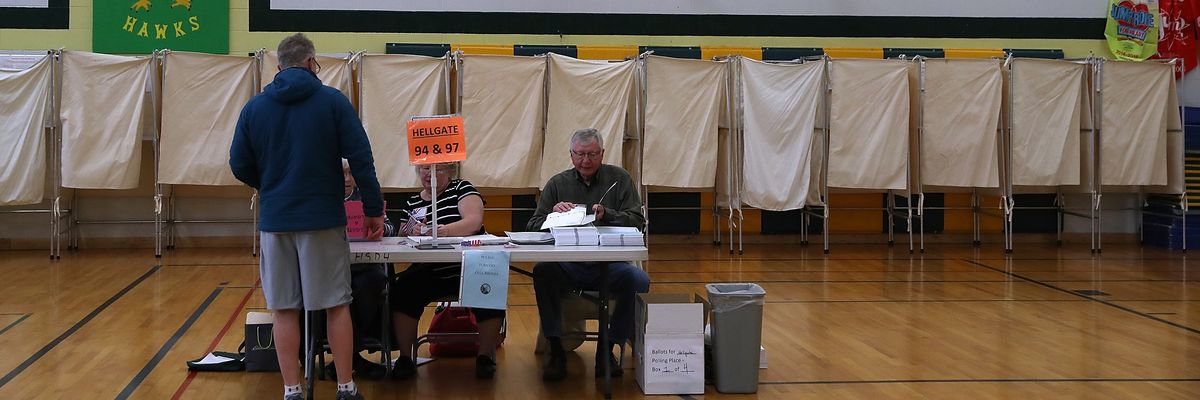Native rights groups were among those applauding a decision by the Montana Supreme Court late Wednesday as four voting restrictions, passed by the Republican-controlled state legislature in the wake of former President Donald Trump's 2020 election loss, were struck down as "unconstitutional."
The sweeping 2021 laws had ended same-day voter registration, eliminated the use of student ID cards as a form of identification for voters, banned the distribution of absentee ballots to teenagers who would turn 18 by Election Day, and prohibited third parties from collecting ballots and returning them on behalf of voters.
Indigenous rights groups and tribes including Native Voice, Montana Native Vote, the Blackfeet Nation, the Confederated Salish and Kootenai Tribes of the Flathead Reservation, the Fort Belknap Indian Community, and the Northern Cheyenne Tribe filed a lawsuit in 2021 to challenge H.B. 176 and H.B. 530, the two laws pertaining to same-day registration and ballot collection.
Chief Justice Mike McGrath noted that Native people were disproportionately affected by the two laws, writing that it is "much more difficult on average for people living on reservations to either get to a polling place on or before Election Day, or to mail an absentee ballot prior to election day."
The summary of the majority opinion said the laws "violate the fundamental right to vote provided to all citizens by the Montana Constitution."
The court upheld a district court ruling from 2022.
"Today's Montana Supreme Court decision is a great victory for our clients and all Native Americans in Montana, who have asked for nothing more than the ability to exercise their fundamental right to vote," said Jonathan Topaz, staff attorney at the ACLU's Voting Rights Project. "Once again, courts have struck down the Montana Legislature's attempts to unconstitutionally burden the constitutional rights of Native Americans across the state. We will continue to fight for Native American voters in Montana and across the country to preserve their fundamental, constitutional right to vote."
Jacqueline De León, staff attorney for the Native American Rights Fund, called the 4-3 ruling "a resounding win for tribes in Montana."
"Despite repeated attacks on their voting rights, tribes and Native voters in Montana stood strong, and today the Montana Supreme Court affirmed that the state's legislative actions were unconstitutional," said De León. "Native voices deserve to be heard and this decision helps ensure that happens."
Josh Douglas, a law professor at University of Kentucky, wrote at Election Law Blog that the state Supreme Court "put real teeth into [the] state constitutional protection for voters," recognizing that the Montana Constitution goes further than federal law in protecting voting rights.
As the state constitution reads, "All elections shall be free and open, and no power, civil or military, shall at any time interfere to prevent the free exercise of the right of suffrage."
"The court refused to follow federal precedent, noting that '[t]his court can diverge from the minimal protections offered by the United States Constitution when the Montana Constitution clearly affords greater protection—or even where the provision is nearly identical,'" wrote Douglas. "State courts have various tools within state constitutions to robustly protect voters. The Montana Supreme Court's decision offers a solid roadmap for how to use state constitutional language on the right to vote. Other state supreme courts should follow the Montana Supreme Court's lead."
The ruling comes as Sen. Jon Tester (D-Mont.) faces a competitive race for reelection.
Ronnie Jo Horse, executive director of Western Native Voice, said the ruling "reinforces the principle of equitable access to voting services and the protection of the rights for all voters."
"We are very pleased with today's landmark ruling," said Horse. "It stands as a testament to justice prevailing in defense of the rights of Montanans, especially those of Native American communities."

